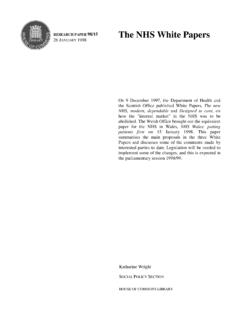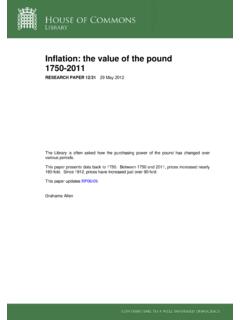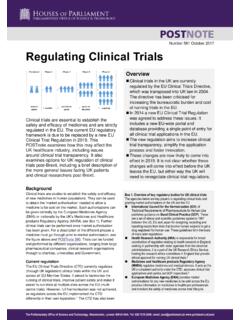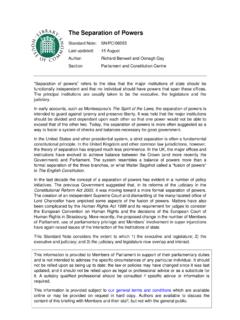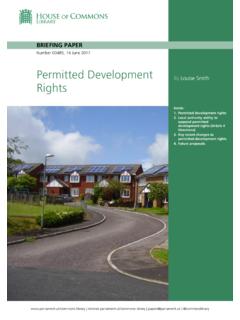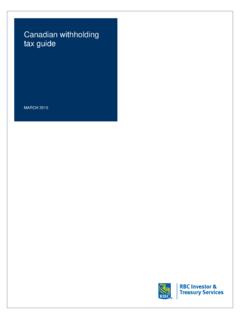Transcription of Occupational pension increases
1 | | | @commonslibrary BRIEFING PAPER Number CBP-5656, 11 December 2020 Occupational pension increases By Djuna Thurley Contents: 1. Introduction 2. Limited price indexation (LPI) 3. 2011 - switch to the CPI 4. Whether there should be flexibility in scheme rules 5. Reform of RPI methodology 6. Revaluation of deferred pension rights 2 Occupational pension increases Contents Summary 3 1. Introduction 6 2. Limited price indexation (LPI) 7 Pensions Act 1995 7 Pensions Act 2004 reduction in the cap 8 2007 review 9 Calls for indexation of pre-1997 rights 10 3.
2 2011 - switch to the CPI 12 Budget 2010 12 Consultation on a statutory override 15 Legal challenges 16 4. Whether there should be flexibility in scheme rules 18 British Steel pension Scheme consultation 18 Conditional indexation 19 5. Reform of RPI methodology 23 Background 23 Impact on DB schemes 27 6. Revaluation of deferred pension rights 31 Contributing Authors: Djuna Thurley 3 Commons Library Briefing, 11 December 2020 Summary Defined Benefit (DB) pension schemes provide pension benefits based on salary and length of service.
3 There are statutory minimum requirements on them to: - Index pensions in payment in line with inflation, capped at 5% for benefits accruing from service between April 1997 and April 2005, and at for benefits accruing from April 2005 - known as Limited Price Indexation (LPI) (Pensions Act 1995, s51); - Revalue the deferred pensions of early leavers in line with inflation capped at 5%, and at for rights accrued on or after 6 April 2009 ( pension schemes Act 1993). Before April 1997 there was no general obligation on DB schemes to increase pensions in payment (although there was a requirement on schemes that were contracted out of SERPS to provide indexation capped at 3% on rights accrued from 1988) - see Guaranteed Minimum pension (GMP) increases , Commons Library Briefing Paper, CBP 4956, Feb 2020.
4 Importantly, these are statutory minimum requirements -there is nothing to prevent schemes from making more generous arrangements through their scheme rules (HC Deb, 19 July 2010, c4). Despite the fact that indexation was not made mandatory for rights accrued before 1997, it appears that many schemes did apply some form of inflation protection to pensions in payment on a voluntary basis and many applied LPI retrospectively to service before 1997 (Deregulatory Review, March 2007) Members of some Occupational pension schemes such as the Hewlett Packard pension Association have called on the Government to require indexation of pre-1997 rights.
5 However, the Government has has no plans to do this, on the basis that it would mean significant additional expenditure for any scheme and its sponsoring employer - see Library Debate Pack CDP- 2017-0016, September 2017. Development of limited price indexation In 1993, the pension Law Review Committee, chaired by Professor Roy Goode, recognised the importance of indexation from the individual s perspective: Most important is the uncertainty with regard to inflation. The individual is concerned not with money amounts but with what the pension will buy.
6 ( pension Law Reform. The report of the pension Law Review Committee, para ) Despite this, the Committee did not recommend making indexation requirements retrospective, because it: [..] recognised that to require all earnings-related schemes to introduce LPI for pension rights accrued before the appointed date would place a considerable burden of costs on such schemes . (Ibid) Limited Price Indexation (LPI) a requirement to index pensions in payment in line with inflation capped at 5% - was introduced under the Pensions Act 1995 (s51).
7 The Labour Government legislated to reduce the LPI cap to for rights accrued from April 2005 in the Pensions Act 2004 (s278-9). Following consultation, it had decided that mandating some level of protection from inflation remains desirable but that lower inflation levels made a reduction in the cap appropriate (Cm 5835, p23). In December 2006, an independent review looked at whether LPI should be removed. However, the reviewers representing the employer and union sides - were unable to 4 Occupational pension increases agree.
8 The Labour Government decided not to remove the requirement on the grounds that it was an important protection for members and there was no clear evidence that removing it would have a direct and significant effect on employer provision (Government response to Deregulatory Review, October 2007, p6). Switch to the CPI From April 2011, the Coalition Government changed the measure of inflation used for determining the annual minimum increases from the Retail Price Index (RPI) to the Consumer Prices Index (CPI) (HC Deb, 8 July 2010, c14-16 WS).
9 The change was controversial because the CPI inflation tends to be lower than RPI inflation. The impact of the legislative change on individual schemes would depend on what their rules said (DWP, Impact assessment, 12 July 2011). The Government considered introducing a statutory override to allow schemes to change their rules where they might otherwise be prevented from doing so. (DWP, The impact of using CPI etc consultation on Government proposals, December 2010). However, it decided against on grounds that trust in pensions was important and that government justification demanded strong justification.
10 Where a scheme did intend to change its rules for future accruals, employers would be required to consult (Government response to consultation, June 2011, para 18 and 34). Whether there should be flexibility In its December 2016 report on Defined Benefit pension schemes , the Work and Pensions Select Committee said schemes that had latitude in their rules to switch to the CPI had tended to do so. It recommended that the Government consult on permitting trustees to propose changes to scheme indexation rules in the interests of members : pension promises are just that.


